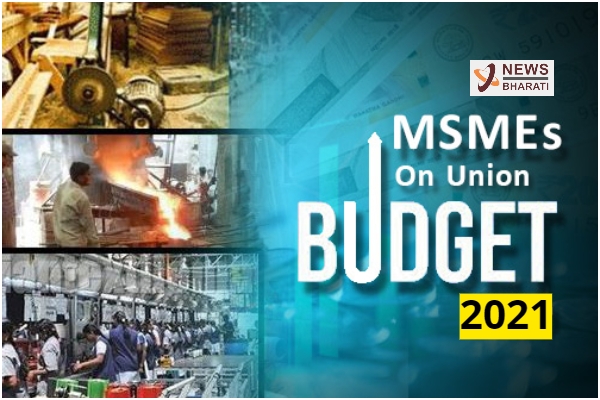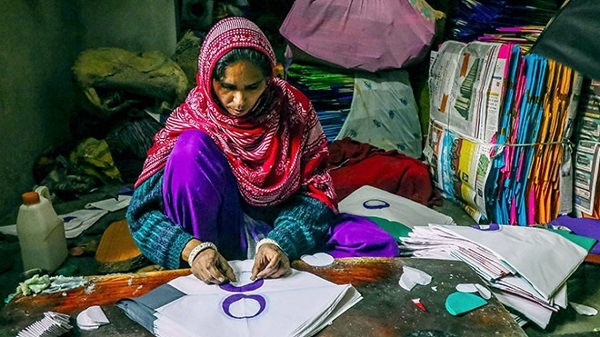BUDGET 2021- What does MSME, the growth engine of economy expect?
Total Views |
MSMEs form an important component of the Indian economy. As per latest report of Ministry of MSMEs there are more than 6.33 crore MSME units throughout the country which contribute around 6.11% of the manufacturing GDP and 24.63% of the services sector GDP. It also contributes 50% to our exports. But the most important role is their employment generation capacity. MSMEs provide employment to 12 crore people and thus they are the second largest employment generating sector after agriculture. In view of these factors MSMEs are rightly called as growth engine of economy.
However MSMEs are facing the stress since last couple of years due to decreased demand, liquidity crisis and other bottlenecks in the ecosystem. But the ongoing COVID-19 pandemic has made a devastating effect on them threatening the very survival of MSMEs.

It is difficult to predict when this pandemic will be over but even after it’s over; its socio economic effects will be felt for an unimaginably long period and much more devastating than anticipated thus threatening the very survival of MSMEs. Large industries may resume their activities once the situation returns to normalcy as they have got easy access to various avenues of resources but MSMEs will find it challenging to resume their operations so soon because of losses they would have suffered during pandemic and their inability to raise fresh resources as loan accounts of most of these units are either under stress or have already became NPAs. Government has taken lot of initiative under its Atmanirbhar Bharat Scheme to provide support MSMEs but considering the magnitude of the issue MSMEs have great expectations from upcoming Budget 2021 which can be summarized as under-
1. Deposits & unsecured loans from friends & relatives-
Most of the MSMEs are family owned businesses and it was their regular practice & tradition to borrow unsecured loans from relatives & friends to start & run the activity. This was a very important source typically for MSMEs who do not receive the adequate financial facilities from Banks & financial institutes. However since this provision has been withdrawn now and its contravention is treated as illegal by law there is a need to withdraw this restriction and permit the “unsecured loans from relatives & friends” for MSMEs. It may be regulated with mandatory requirement of PAN & other details of depositors with declaration.
2. Concept of Single shareholder company (SSC)-
The concept of SSC is very important option to the Proprietary firms to become formal entity. However the prescribed restriction of paid up capital of Rs 50 lakhs & turnover limit of Rs. 200 lakhs are making it unattractive & needs to be corrected in line with new MSME definition.
3. Availability of Finance-
MSMEs are solely dependent upon institutional credit unlike large corporate which can raise funds from alternate sources. Hence it is utmost important that seamless and affordable credit should be made available to them. Many initiatives have been taken during last couple of years but more needs to be done. The first and foremost is establishment of dedicated bank branches for MSMEs where staff should be well equipped to address the issues of MSMEs. Every bank must have at least one dedicated MSME Branch in each district.

4. Relaxation in NPA Norms-
The present NPA norms prescribe that any amount due from borrower is not received within 90 days the entire loan account becomes NPA. This 90 period is most unrealistic as the most of the MSMEs are either suppliers to large corporate or Government Departments which seldom pay their dues within this time frame. This norm was relaxed during Covid Pandemic and the period was extended to 180 days. This extension should be made permanent by amending NPA norms.
5. Statutory status for Framework for Revival and Rehabilitation of MSMEs -
Even though RBI has prescribed Framework for Revival and Rehabilitation of Stressed MSMEs, they are not followed in letter and spirit by lenders in absence of any statutory provision. A suitable legislation should be made so that it becomes mandatory for lenders to follow the guidelines before taking any recovery action against MSMEs. It will arrest the recent trend of summarily invoking SARFSAEI/DRT provisions against MSMEs once they are classified as NPA and judicious process for their Revival and Rehabilitation will be ensured.
6. Establishment of Supervisory authority for implementation of various Government Guidelines-
During last couple of years government has issued many guidelines to financial institutions for the benefit of MSMEs. But in absence of any Supervisory authority for monitoring their implementation, they have remained on paper only and their benefits have not reached to MSMEs. At present Central Government has MSME-Development Institutes at various centres which can be empowered with suitable powers to Supervise and monitor the implementation the various guidelines issued by Government/RBI to financial institutions.

7. IBC/NCLT Resolution Process –
Recently the Resolution Process for MSME Companies was discussed in the IBA meeting. The recommendations made by the advisory committee of stake holders are not yet notified. There is an urgent need to issue notification in this regard to give an exit route of resolution process with the amendments recommended for the MSME companies.
8. Establishment the Resolution process for “non corporate” firms-
Non corporate firms have 83% presence in the total commercial establishments as per the Economic census 2016. They are almost all typical MSMEs with an individual or family owned business. It is very important to establish the Resolution process for “non corporate” firms on priority so as to ensure the viable & honourable exit route for them. This will also enable perpetual continuation of the activity by change of hands via RP which will be a win win position to all the stake holders. Today these establishments are becoming soft targets by the Banks & FIs for liquidation under the SARFESAI ACT without any resolution process defined for them which leads to the complete closure of the units, putting all the stake holders to loss.
9. Revision of threshold limit for Insolvency notice by operational creditor-
Recently during the Pandemic Lockdown period, the IBC/ NCLT provisions in these regards were amended and threshold limit of credit amount was raised to Rs 1 Cr from Rs 1 Lakh. It is observed that majority of the MSME operational creditors have credit outstanding of less than Rs 1 Crore and hence are unable to recover the amount from the corporates. In view of this threshold limit should be reduced to Rs 10 Lakhs so that MSME creditors can use it to recover the over dues from large corporates.
.
.


